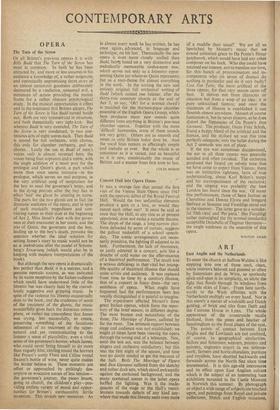OPERA
The Turn of the Screw OF all Britten's previous operas it is with Billy Budd that The Turn of the Screw has most in common. In both he has been attracted by, and more or less assumes in his audience a knowledge of, a rather enigmatic and operatically unpromising short story of an almost unnatural goodness deliberately destroyed by a vindictive, unnamed evil, a minimum of action providing the merest frame for a rather obscure psychological study. In the musical opportunities it offers and in the treatment that Britten adopts, The TuPn of the Screw is like Budd turned inside out. Both are very symmetrical in structure, and both thematically very tight-knit. But whereas Budd is very extended, The Turn of the Screw is very condensed, in two con- tinuous acts of eight scenes each. Then Budd is scored for full orchestra, with chorus, this only for chamber orchestra, and no chorus. Lastly the use in Budd of men's voices only is almost reversed here, the voices being four sopranos and a treble, with the single addition of a tenor part for the prologue and Quint's ghost, a part whiCh more than once seems intrusive—in the prologue, which serves no real purpose, in the very artificial song of temptation for the boy to steal the governess's letter, and in the dying phrases after the_ boy has in effect 'laid' the ghost by uttering its name. The parts for the two ghosts are in fact the dramatic weakness of the opera, and in spite of such musically magnificent and con- vincing scenes as their duet at the beginning of Act 2, Miss Jessel's duet with the gover- ness at their encounter in her room, and the trio of Quint, the governess and the boy, leading up to the boy's death, provoke the question whether the ideal solution for setting James's story to music would not be as a melodrama after the model of Schoen- berg's Erwartung (which would also be in keeping with m?dern interpretations of the book).
But although the new opera is dramatically less perfect than Budd, it is a success, and a genuine operatic success, as was indicated by its warm reception by the Italian audience which could have understood little of the libretto but was clearly held by, the marvel- lously suggestive and gripping music. In spite of the violence his libretto occasionally does to the book, and the crudeness of some of the treatment of the ghosts, the music wonderfully gives back the Jamesian atmos- phere, or rather tne atmosphere that James was trying, less successfully, to create, preserving something of the fastidious refinement of its treatment of the super- natural and yet communicating to the listener a sense of plausibility, even a vivid sense of the governess's horror, which James, who could never bring himself to do more than vaguely hint, circling round the horrors like Proust's aunts Flora and Celine round Swann's bottle of wine, never quite makes the (reader believe in. These moments are offset or approached by strikingly des-
criptive or evocative scenes of less tension—
the governess's journey, the piano lesson, going to church, the children's play—pro- viding endless variety of mood and oppor- tunities for Britten's inexhaustibly fertile invention. This reveals new resources. As
in almost every work he has written, he has once again advanced, in language and technique, on his last. Thematically the new opera is even more closely unified than Budd, beirrg based on a very distinctive and melodically memorable twelve-note row, which serves not only as a leitmotiv repre- senting Quint (or whatever Quint represents) but as a root-theme for almost everything in the work. In the scoring the new and entirely original full orchestral writing of Budd (which caused one listener, after the thirty-two common chords at the end of Act 3, to say, 'Oh! for a normal chord') is matched for the thirteen-piece chamber ensemble of the English Opera Group, which here produces many new sounds quite different from anything in Britten's previous chamber operas. Together with the more 'difficult' harmonies, some of these sounds are very gritty. Others are as smooth and sweet as only Britten today dare be. And the vocal lines remain as affectingly simple and melodic as ever. But the whole is as consistent as it is varied, and as beautiful as it is new, unmistakably the music of Britten and a master from first note to last.
COLIN MASON


































 Previous page
Previous page